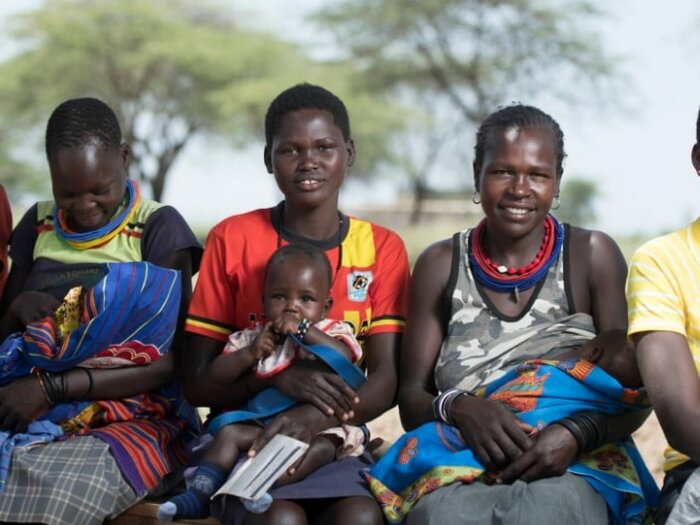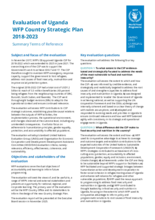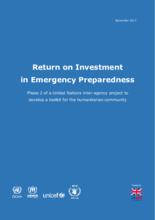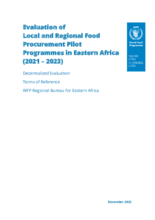Uganda
- 19.7%
- of people live below the poverty line
- 29%
- of children under 5 are stunted
- 39 million
- population
A land-locked country in East Africa, Uganda produces more food than it consumes. Yet, poverty still limits people’s access to nutritious food, especially in the north and east of the country.
A fast-growing population – expected to reach 100 million by 2050 – and the presence of the world’s third largest refugee population pose further challenges to the country’s ability to achieve Sustainable Development Goal 2 on Zero Hunger.
Uganda hosts more refugees than any other country in Africa, including people who have fled from South Sudan, the Democratic Republic of Congo and Burundi. The Government gives refugees plots of land to cultivate, to encourage their self-sufficiency. However, as the number of refugees – especially from South Sudan – grows, these plots become gradually smaller.
What the World Food Programme is doing in Uganda
-
Crisis response
-
WFP provides cash/food assistance to meet the food and nutrition needs of over one million refugees as well as Ugandans affected by recurring climate shocks. Upon arrival, refuges receive high-energy biscuits at the border and hot meals in transit centres. They are then registered to receive cash or food as they settle down and are allocated with land. WFP works with partners to promote early transition from food assistance to self-reliance. In response to allegations of fraud and corruption in Uganda’s refugee response made early in 2018, WFP introduced biometric verification of all refugees receiving its food or cash. This should ensure that the right people receive the assistance they need.
-
Resilience building
-
WFP provides food insecure people with income support and skills training in exchange for the building of assets – such as woodlots, farms, orchards, irrigation systems, water pond and dams – that enhance their livelihoods and reduce vulnerability to climate shocks.
-
School meals
-
School children in areas where food security, nutrition and education indicators are low receive one nutritious meal per day from WFP or the Government. WFP also works with the ministries of education, agriculture and finance to establish a national school feeding policy and a sustainable school meals programme which includes the purchase of ingredients from local smallholder farmers.
-
Nutrition
-
To reduce malnutrition rates in the areas where they remain high, WFP is providing vulnerable populations with specialized nutritious food, nutrition-sensitive cash transfers, nutrition counselling and communication aimed at promoting the consumption of more nutritious food.
-
Support to smallholder farmers
-
Working with the Ministry of Agriculture and other UN agencies, WFP trains smallholder farmers (including refugees and members of host communities) on ways to increase productivity, diversify crops to enhance nutrition, control quality and access markets. WFP also builds warehouses for smallholder farmer groups and subsidizes equipment as part of a wider programme for reducing post-harvest food losses.
-
Capacity strengthening
-
WFP works to increase the capacity of national and subnational institutions to coordinate and manage food security and nutrition programmes and respond to shocks, including through the development of a unified platform to register beneficiaries of government and development partners programmes.
-
Supply chain support
-
WFP provides other humanitarian agencies with supply chain services and expertise to support their operations in Uganda and the region
In focus
At hunger's ground zero in Uganda, an aid worker counts her sacrifices, and blessings
On the front lines in Karamoja
Denmark contributes US$1 million to cash relief for refugees in Kampala
News release | 10 July 2020
‘Photography became my blood’
Always ready to go to the field
‘This child was abandoned on Christmas Day’
Boosting business in Uganda
New approach to addressing malnutrition in Uganda shows promise in saving more children’s lives
Uganda news releases
Go to pagePartners and donors
Find out more about the state of food security in Uganda
Visit the food security analysis pageOperations in Uganda
Contacts
Office
Physical address: Clement Hill Road, Plot 17-19, Kampala, Uganda; Postal address: P.O. Box 7159, Kampala, Uganda
Kampala
Uganda





